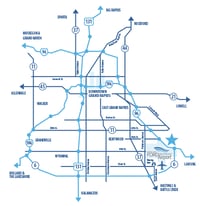Grand Rapids, Mich. — The Gerald R. Ford International Airport (GFIA) today shared details of its testing process as it nears the conclusion of its sample collection phase. The complex testing process, which involves the drilling of five deep monitoring wells on the Airport’s property, is part of GFIA’s evaluation to determine the presence of polyfluoroalkyl substances (PFAS).“Our longstanding commitment to environmental stewardship involves a promise to the community to take the proper and involved steps to ensure we achieve the most accurate and reliable test results,” said GFIA President & CEO Jim Gill, A.A.E., IAP. “We acted quickly but responsibly to start the testing process and to engage in the most accurate forms of testing to determine what further response may be needed. This is a responsibility we don’t take lightly, and one requiring both patience and diligence.
” The use of firefighting material known as AFFF, or aqueous film-forming foam, is a FAA requirement for all commercial airports across the country, and has therefore been used for extinguishing jet-fuel fires and related firefighting training at airports for many years.
“Currently all of the AFFF formulations specified for use by the FAA contain some type of PFAS. The question of PFAS potential environmental impacts is one to which commercial airports across the country, including the Ford Airport, and many U.S. Military aircraft bases are looking for guidance from environmental agencies and experts,” said Gill.
Following the development of a strategic testing plan, GFIA began its investigation by testing sites on airport property in the vicinity of the previous fire training facility. The airport is working with Test America, a specialized laboratory to conduct these EPAcertified analyses. Quality control for sampling and analysis is a priority of this environmental investigation.
GFIA’s testing so far has included drilling five deep groundwater monitoring wells, and drilling 10 shallow borings on GFIA property.
“All of our work will allow the Airport to better characterize existing conditions and other key factors for informing additional investigations based on these results,” explained Casey Ries, P.E., GFIA’s Engineering & Facilities Director.
“Conducting accurate and appropriate testing takes time,” Ries said. “Our scientific approach has been designed to address the highest areas of potential first, and is a continued, deliberate investigation. Once the Airport has complete and accurate data to share, we stand ready to reveal the results of our investigation.”
Ries outlined the very sensitive PFAS testing process; one that requires planning certified testing methods, analysis, and adherence to specific and precise procedures to ensure appropriate sample collection.
For PFAS, the testing is trying to identify and validate the presence of specific chemicals in extremely low parts per trillion (ppt). The actual testing process involves everything from ensuring proper equipment/sampling tool use as well as ensuring proper field clothing is worn, he said. For instance, field testers cannot consume or be in contact with fast-food, perfume and other variables which can influence the integrity of the tests, and contaminate results during the collection process. PFAS is found in certain clothing types and coatings, as well as some collection equipment that must be avoided. Water samples also need to be kept at a certain temperature while being transported to the labs.
“Sampling requires extra care and attention to collection procedures and materials,” Ries said. “Our team is utilizing strict quality control procedures for the collection and analysis of PFAS samples specifying allowable materials and procedures to minimize the possibility of generating inaccurate and unreliable results.
” Ries said results from this ongoing investigation should be available to the Airport in June, and those findings will be coordinated with ongoing Michigan Department of Environmental Quality (MDEQ) and Public Health activities.
“These results will help to inform future investigation decisions. The Airport believes it will be in a position to brief the Michigan Department of Environmental Quality on those results and its plans for any additional investigations when results are finalized pursuant to quality control and assurance protocols.”
The Gerald R. Ford International Airport has won numerous national and state awards for its environmental work, including:
2018 American Institute of Aeronautics and Astronautics (AIAA) American Association of Airport Executives (AAAE) Airports Consultants Council (ACC)
- Jay Hollingsworth Speas Airport Award “For and innovative and sustainable Stormwater deicing Gerald R. Ford International Airport Authority 5500 44th Street SE Grand Rapids, MI 49512-4055 ph 616.233.6000 fx 616.233.6025 flyford.org treatment system that provides an example to other airports in meeting operational, regulatory, and community needs”
2017 American Council of Engineering Companies (ACEC) – Michigan
- Engineering Merit Award
2017 American Council of Engineering Companies (ACEC)
- Engineering Excellence Awards
- National Recognition Award
2016 Airports Council International-North America (ACI-NA)
- Environmental Achievement Award
- Environmental Mitigation – Recognizing outstanding leadership and contributions In the airport industry for environmental protection and preservation
2016 American Society of Civil Engineers (ASCE) – Michigan Section
- Outstanding Civil Engineering Certificate of Merit Award
2014 Airports Council International-North America (ACI-NA)
- Environmental Achievement Award
- Outreach, Education, and Community Involvement
“Our adherence to excellence in environmental stewardship is a tradition we plan to uphold, now and into the future,” said Gill. “It’s all about doing what is in the best interest of the community and our local environment.”
ABOUT GFIA
The Gerald R. Ford International Airport (GFIA) is the second busiest airport in Michigan. The Airport served over 3.26 million passengers in 2018 and over 8,000 travelers pass through GFIA each day. The Gerald R. Ford International Airport offers nonstop service to 32 major market destinations with more than 140 daily nonstop flights. The Gerald R. Ford International Airport is managed and operated by the Gerald R. Ford International Airport Authority. GFIA generates over $3.1 billion in annual economic output throughout West Michigan, and employs over 2,000 people.




